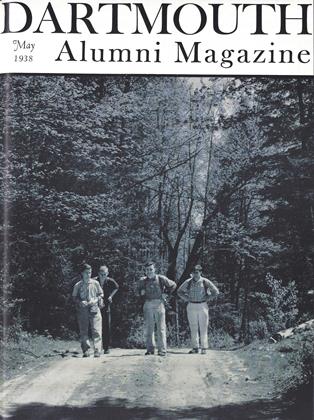Contemporary with these activities was not only the President's announcement concerning fraternities that houses could not henceforth pledge sophomores on probation, but a rather drastic shakeup of rushing rules and chapter size as announced by the Interfraternity Councilimportant measures in what seems to point to an effective program in removing the abuses of the Dartmouth fraternity system The main abuse has been the domination of the larger houses on campus over the smaller by virtue of larger physical plants, a greater number of members, better financial status, and the resulting tendency toward greater prestige and influence upon sophomore delegates during rushing. The plan, which points toward the improvement of what has resulted in an unhealthy condition of a number of houses, calls for eventual limitation of house membership to 55 undergraduates, as well as revised rushing and pledging rules.
The main tenets of the plan, as drawn up by the Interfraternity Council, are: no fraternity shall after 1940-41 be allowed more than an aggregate of 55 members, all pledging will take place at the office of the College Adviser to Fraternities open for the purpose from the second Tuesday after Convocation throughout the college year, no man on probation may be pledged, no fraternity shall have within its membership more than five men who are exempt or partially exempt from established fraternity dues and taxes. The plan in purpose not only strengthens the weaker houses, but in so doing cleans up rushing and pledging which in many ways have been two of the disagreeable features of the system.
After having considered the pro's and con's of the proposal, the writer was not definitely sure whether he favored it or not; but he is in favor—and many other undergraduates seem to be of the same opinion—of the College's revitalization plan, and if the Committee's program is an integral part of this movement as it certainly appears to be, he is for it. The new spirit on campus in the interfraternity competition for points, for instance, is a good sign that the fraternities wish to fight for their existence and prove their worth. This new plan will very possibly do much to furnish the fraternities with that opportunity. Dartmouth has had its fraternities for a long time, and many of its traditions and activities have grown up around them. It scares many undergraduates to realize that fraternities in this College are really on trial for their lives. That they have suffered, from time to time, extreme proximity to extinction is now, however, less important than the fact that they seem to be on the upward climb, flushed with a healthy vigor that will insure their remaining of prominent import in Dartmouth life.
Despite the mass of extra-curricular activity during the past month, the academic side of the picture (there is one) was nevertheless nourishing the College news channels regularly. There was the election of the Senior Fellows—seven men to pursue their own interests during their senior year; five men to Graduate Fellowships, one year further study in different fields at various universities; and election of the Class of 1926 Fellow—senior year spent in study of some political topic at Washington, D. C. The fact that education has become increasingly "personalized" at Dartmouth during the past few years, substantiated by the creation of Senior Fellowships, the majors and topical-majors plan which aims toward integrated study, and the encouragement of the Committee on Educational Policy for individual adjustment in the curriculum, is indication that this College among a number of others has liberalized itself considerably by offering the students a general education as well as training in specific fields of study. And the undergraduates, who are thus allowed greater freedom in the choice of what they shall learn, are liking it. A happy medium seems to have been struck between the two extremes: the old castor oil type education and the unrestrained, undisciplined and completely individual type, which too often leads to surveys of detective novels, and a study of the mechanics of playing hookey.
Meanwhile: new leaves, Green Key, bright afternoons and ozone. Busy with the hundred activities of the late 'teens and early twenties, among which at present, the collecting of swing records rates first at Dartmouth, and the treatment of pinkeye and measles have until recently run a close second—Dartmouth speeds through the remaining weeks of the spring term, having penciled off, for diversion, the days until (1) Green Key (2) the conclusion of final exams.
MECCA FOR UNDERGRADUATE CLIMBERS Now that warm weather has arrived in the north country, Dartmouth hikers are againheading for the summit of Mt. Moosilauke each week end.
 View Full Issue
View Full Issue
More From This Issue
-
 Article
ArticleDartmouth in the Dictionary of American Biography
May 1938 By WILLIAM A. ROBINSON -
 Article
ArticleGradus Ad Parnassum
May 1938 -
 Sports
SportsFollowing the Big Green Teams
May 1938 By Bob Haslam '39 -
 Article
ArticleFive Decades of Engineering
May 1938 By MILBURN MCCARTY JR. '35 -
 Class Notes
Class NotesClass of 1918
May 1938 By Allan C. Gottschaldt -
 Class Notes
Class NotesClass of 1910
May 1938 By Hap Hinman
Ralph N. Hill '39
-
 Letters to the Editor
Letters to the EditorLetters
December 1940 -
 Article
ArticleSTUDENTS AID HOSPITAL FAIR
May 1938 By Ralph N. Hill '39 -
 Article
ArticleLARGE NUMBER WORKING WAY
June 1938 By Ralph N. Hill '39 -
 Article
ArticleThe Undergraduate Chair
November 1938 By Ralph N. Hill '39 -
 Article
ArticleDIFFER AS TO MEANS
November 1938 By Ralph N. Hill '39 -
 Article
ArticleThe Undergraduate Chair
February 1939 By Ralph N. Hill '39
Article
-
 Article
ArticleContributions by Classes in the 1948 Alumni Fund Campaign
February 1949 -
 Article
ArticleSigns of "Women's Lib"
FEBRUARY 1971 -
 Article
ArticleTurned Turtle
April 1976 -
 Article
ArticleGreen Jottings
October 1956 By CLIFF JORDAN '45 -
 Article
ArticleSwimming
January 1960 By CLIFF JORDAN '45 -
 Article
ArticleOld Roadster
OCT. 1977 By M.B.R.


